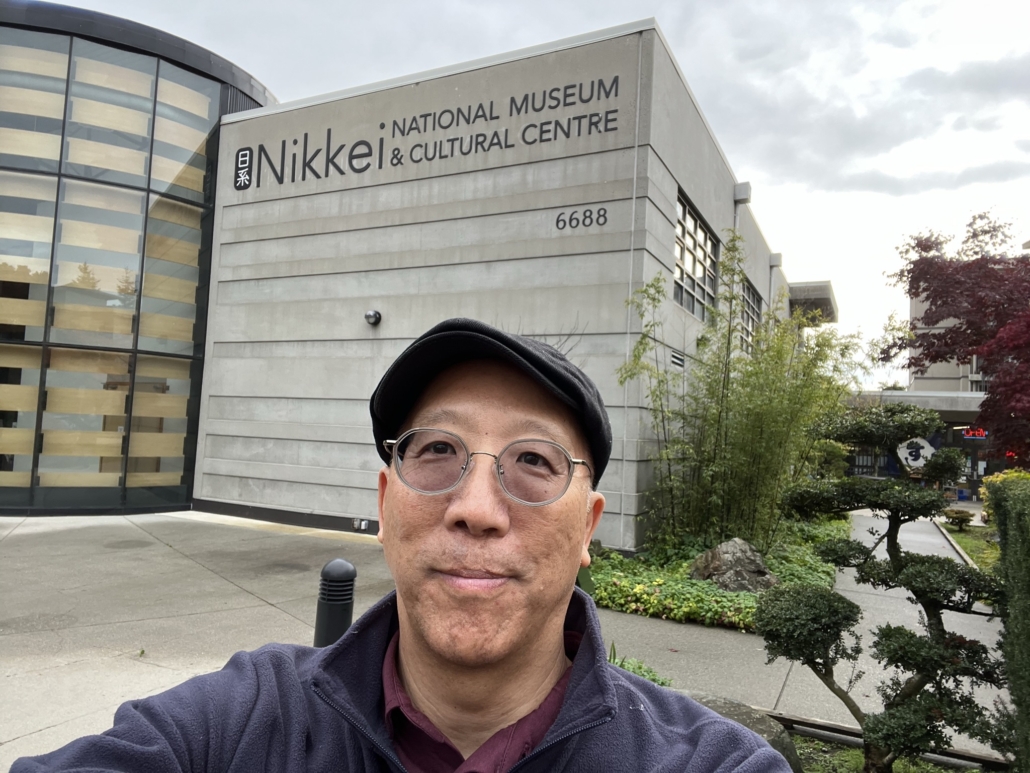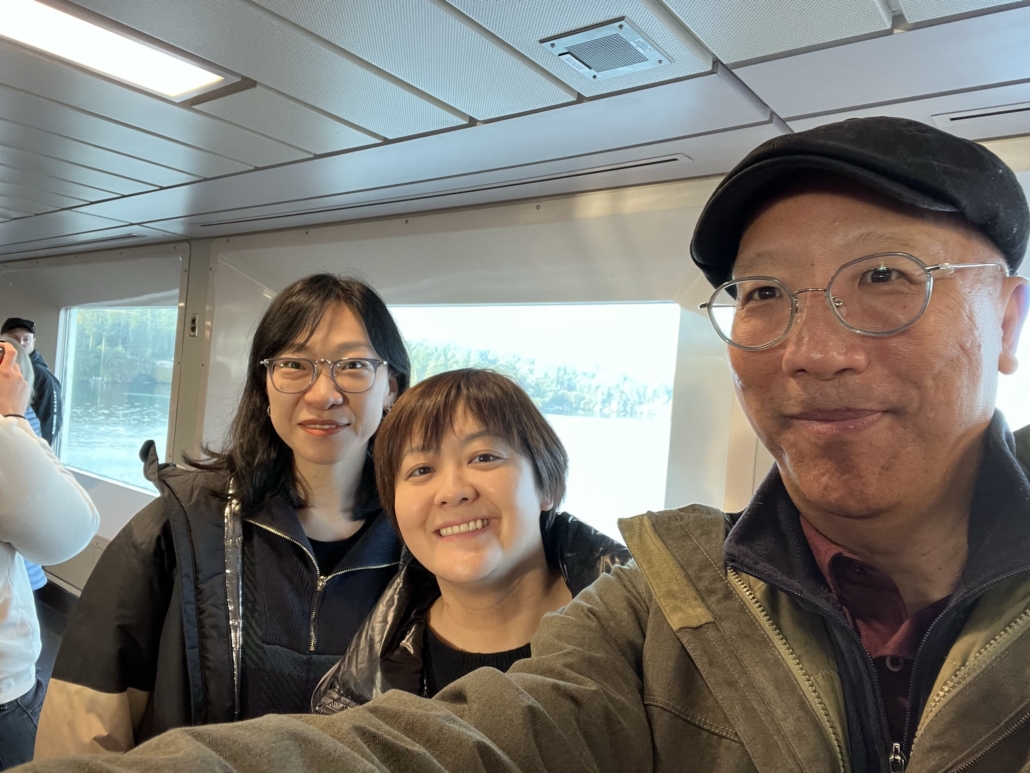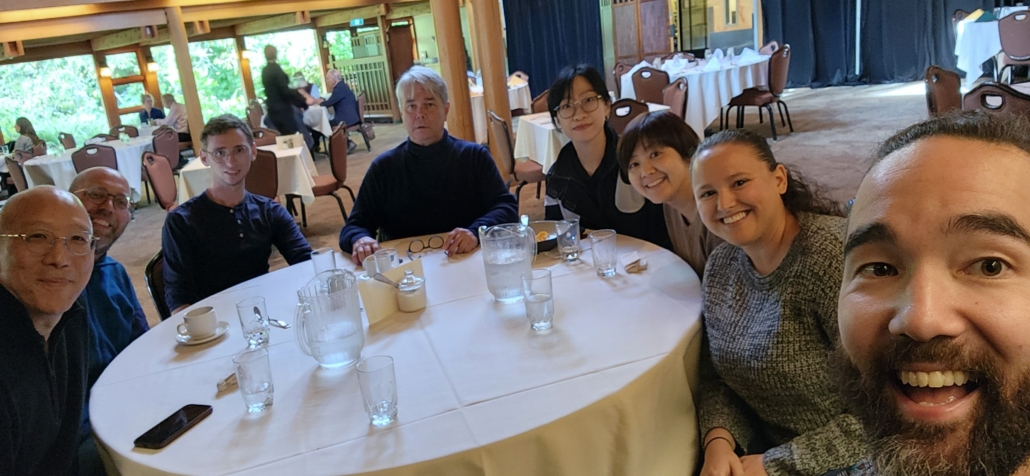Profile: Lon Kurashige

Lon Kurashige at the Nikkei National Museum & Cultural Centre
Lon Kurashige is a professor of history at the University of Southern California. After becoming familiar with the “huge project” of Past Wrongs, Future Choices through academic and professional circles, and learning about significant overlaps with his own research, Lon was encouraged to join the project as a 2023 Scholar in Residence.
“I had already been doing research on public opinion and Japanese Americans,” Lon explains. Through conversations with PWFC Director Jordan Stanger-Ross, however, Lon became interested in learning how public opinion polls in Canada could provide data to help examine “not only what happened in the US, but also what happened in Canada.”
“So that was our idea. I would come up to UVic and look at the Canadian polls and we would think about the US and Canadian polls comparatively.”
“It didn’t turn out that way, because in the end we could find some Canadian polls, but the data wasn’t there. What was available was what the newspapers were publishing—which was useful but it wasn’t really data, it was just published findings. In the US, I have data for many, many polls taken in the 30s, 40s and 50s. So [the lacking poll data] was unfortunate, but I started revisiting and rethinking my research.”

Lon Kurashige (right), with 2023 Artist in Residence Nao Uda (centre), and Post Doc fellow Ciel Dong (left).
While in residence at UVic, Lon gave a presentation to introduce the kind of work he does on public opinion polling relating to Japanese American internment.
“Very, very few people know that there were public opinion polls taken on the internment of Japanese Americans, or related questions around perceptions of Japanese Americans. Very few people know that these polls were taken, and that they asked some really interesting questions,” including questions about employment, trust and loyalty relating to Japanese Americans. “But nobody has really used the data itself to do any kind of statistical analysis.”
“So a lot of my analysis involved testing the hypothesis that white racism explains so much of the perception conveyed in public opinion polls. I found that partly true, but I also found it much more complicated.”
Lon noted some interesting findings in the US polls, and how they may challenge or complicate assumptions. In the historical public opinion polls, an overwhelming number of respondents agreed with interning Japanese Americans and “did not trust Japanese aliens.” But it gets more complex: “They asked a follow-up question: who is the biggest threat to national security—Germans, Italians or Japanese? When it came to [who respondents perceived as] the number one threat, it was Germans over the Japanese.”
“So this paper is about rethinking our assumptions that racism explains everything about the internment of Japanese Americans, as well as Nikkei in Canada. I think a lot of the analyses and popular assumptions see race as the all-important variable. And I’m not saying that’s not true, but I’m saying it’s more complicated. Race may be the most important variable, but it hasn’t really been tested in public opinion polls or looked at comparatively.”
With this in mind, an intervention Lon aims to make through his research concerns quantitative history and comparison as adding more complexity to knowledge of public opinions toward Japanese Americans and Japanese Canadians. “What did the person on the street really think? How did responses shift depending on the question being asked?”
“My basic argument is that public opinion polls matter in the study of Nikkei internment. And that they matter if you handle them with statistical rigour.”
“The biggest point is to open up this whole question of racism and public opinion about Nikkei internment to show all of the various and important ways you can approach it—and how complicated this question is, and how interesting it can be.”

The direction his research has taken with Past Wrongs, Future Choices has led Lon to see the existing limits and opportunities possible for research taking up transnational and comparative lenses to Nikkei internment.
“The reason I bring Canada into this academic paper is to say ‘look, there’s a possibility here, because the US wasn’t the only place that took polls, and it wasn’t the only place that interned Nikkei’. So there’s an international or transnational comparison that’s possible if you can find the data.”
“The residency at UVic was important for shattering my assumptions that Canada doesn’t matter for my research, for the kinds of questions I’m interested in. Now I say, ‘wow, I can explore all the questions I have about race, about internment, about Nikkei history, through a comparative or transnational lens with Canada. I was always interested in transnationalism with Japan, and now I can triangulate the US with Japan, Canada, and (through Andrew’s work) Australia as well. So it has opened up my imagination—I think that’s the biggest difference. My imagination has just exploded in terms of putting Canada on the map for my research.”

Lon’s experience as a scholar in residence with Past Wrongs, Future Choices is now influencing his next project. Lon is currently conceptualizing a new book project, which aims to look comparatively at Nikkei identities between Canada and the US.
As Lon explains, this new work builds from the experience of visiting Canadian sites and working in environments with PWFC artists and scholars.
“It forced me to think about Nikkei internments as not just historical questions or scholarly historical research questions,” but instead to consider “how an artist views history, versus how a historian views history, versus how a photographer views history”—especially when those perspectives draw on personal and familial histories.
“If this book comes to pass it really would be entirely due to this research fellowship with PWFC—because really without that fellowship I never would be thinking of a book like that about Canada and the US.”
This article was written by Sarah Stilwell from a January 2024 interview with Lon Kurashige, a 2023 Scholar in Residence with Past Wrongs, Future Choices at the University of Victoria. All images supplied are courtesy of Lon Kurashige.

 Instagram
Instagram